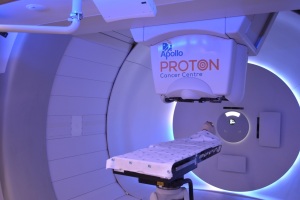por
John R. Fischer, Senior Reporter | January 30, 2019

Apollo Hospitals has opened Southeast
Asia's first proton therapy center
The first proton therapy center in Southeast Asia is up and running in India, offering an advanced form of cancer treatment to a country with more than three million cancer patients and populations outside its borders.
Located in Chennai, the Apollo Proton Cancer Centre (APCC) comprises 150 beds and a 360-degree comprehensive cancer care in the form of advanced multi-room proton therapy with pencil-beam scanning technology, designed by Ion Beam Applications (IBA).
“With more than three million people undergoing cancer care in India and one million new cases being detected every year, there is a real need for specialty cancer treatment," Bao Nguyen, global marketing manager of IBA, told HCB News. "Around 60 to 70 percent of cancer patients need proton therapy, which offers many potential benefits to the patients, such as the potential increase in therapeutic dose within the tumor to raise the probability of eradicating it; the possibility of preserving healthy tissues around the tumor with a consequent reduction in side effects; and a reduction in the overall dose delivered to the patient, thus reducing the risk of a second cancer.”



Ad Statistics
Times Displayed: 16169
Times Visited: 33 Final days to save an extra 10% on Imaging, Ultrasound, and Biomed parts web prices.* Unlimited use now through September 30 with code AANIV10 (*certain restrictions apply)
Having been used to treat more than 180,000 patients worldwide, proton therapy is expected to benefit double that number in the next five years, with centers popping up across the U.S. and Western Europe, as well as Japan and Korea.
The center is equipped with IBA’s Proteus Plus multi-room proton therapy solution, which offers intensity-modulated PT for precise targeting of tumors and maximized preservation of surrounding healthy tissue. With it, clinicians will be able to offer new treatment options to patients, as well as investigate new protocols and re-treatment opportunities.
Another component is its ultra-precise dose painting, which enables users to target the most complex tumor shapes, and expands indications for cancers of the liver, head and neck, lung, breast, gastro intestines and pelvis.
The system was recently used to treat the APCC’s first patient earlier this month, a man suffering from prostate cancer.
Southeast Asia has long awaited the establishment of a center due to countries in the region wanting to see more evidence and progress at centers elsewhere before bringing the treatment to their own populations. In addition, lack of awareness about PT both within public populations and medical communities has contributed to the inability to set up centers across the region.
“With the launch of Apollo Proton Cancer Centre (APCC), India has become the 16th country in the world to offer proton therapy for cancer. With the latest proton therapy technology comprising Intensity Modulated Proton Therapy and Image-Guided Proton Therapy components, it will provide a high degree of precision for the pediatric patients, the brain tumors, sarcomas and solid cancers," said Nguyen. "The launch of the 3-room Proton Cancer therapy center will serve patients not just in India, but also the neighboring countries in South East Asia.”
In an effort to raise awareness, Apollo Hospitals teamed up with the Particle Therapy Cooperative Group to organize the first International Proton Therapy Education Program this past November. The two-day event consisted of interactive scientific programs led by specialists from Austria, Denmark, India, Sweden, Switzerland and the U.S., who relayed their knowledge on the benefits of proton therapy and discussed the application of it in clinical practice. Among the attendees were the health ministers for South Africa, Oman, Yemen and Sri Lanka.
The center currently has 35 patients awaiting treatment and is in the process of planning for seven.

